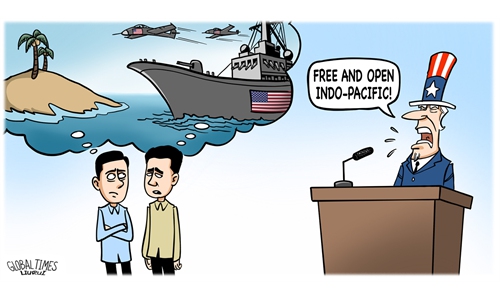ASEAN sustainable development goals unobtainable? Cooperation with China offers opportunities for success

Illustration: Chen Xia/Global Times
In the Asia-Pacific region, progress toward realizing the sustainable development goals has been severely disrupted by the COVID-19 pandemic.
Studies show the region is not on track to achieve any of its 17 Sustainable Development Goals (SDGs) by 2030.
Leveraging partnerships at all levels and across sectors is essential in achieving the goals. ASEAN has integrated SDGs as one of the key pillars to achieve community building. The ASEAN Charter sets out that ASEAN is committed to ensuring sustainable development for the benefit of present and future generations. The ASEAN Community Vision 2025 emphasizes a regional focus on environmental protection for now and the future, adapting and responding to climate change, and promoting green technology and development.
To improve the implementation of the SDG-related policies, the ASEAN Community Statistical System (ACSS) set up a Working Group for Sustainable Development Goals Indicators Baseline in 2017 to keep track of the progress of ASEAN member states in achieving SDGs. The first report, released in 2020, shows that protecting the environment and biodiversity needs more attention and investment.
China is one of the key dialogue and development partners of ASEAN. In November this year, at the summit commemorating the 30th anniversary of the establishment of China-ASEAN Dialogue Relations, China and ASEAN upgraded to a comprehensive strategic partnership. The China-ASEAN strategic partnership for shared growth and a community with a shared future offers guidelines and cooperation opportunities to realize sustainable development goals.
In October, ASEAN and China adopted a joint statement on enhancing green and sustainable development cooperation covering various issues from environmental protection to socioeconomic recovery from the COVID-19 pandemic, as well as narrowing the development gap. The statement also stresses the importance of fostering and expanding cooperative partnerships among governments, international organizations, research institutions, financial institutions, the private sector, and local communities to promote green and sustainable development in the region jointly.
Moving forward, China and ASEAN need to materialize the political declarations commitments by developing concrete action plans as well as promoting results-based cooperation. In terms of the areas of cooperation, the following should be considered.
First, promoting quality and climate-resilient infrastructure development. China is the top investor and development partner in infrastructure development in Southeast Asia, especially under the framework of the China-proposed Belt and Road Initiative (BRI). Improving the quality of the BRI projects would therefore be critical.
Second, offering mutual support to sustain and diversify the sources of growth is the foundation for achieving the SDGs. Further diversification of the economy will require fostering entrepreneurship, expanding technology, and building new skills to address emerging labor market needs.
Third, the localization of SDGs requires a cohesive and responsive mechanism. To effectively localize SDGs, we need to simultaneously enhance the capacity of the public and private institutions and develop innovative partnerships among different stakeholders.
Fourth, it is crucial to develop SDG investment needs and trends. Therefore, China and ASEAN should work together on costing approaches and steps, financing strategy, and mainstreaming SDGs into the national budgetary processes and fiscal policies.
Fifth, it is imperative to develop an innovative and blended financing policy for SDGs. ASEAN and China should work together to expand the sources of public finance on SDGs. The private sector plays an increasingly vital role in expanding new sources of SDG-aligned financial flows.
Sixth, China and ASEAN should work together to improve the quality of investments by institutionalizing ESG (environment, social, governance) principles in corporate strategy, improving transparency and accountability of the capital market, and strengthening innovation capacity to address the social, environmental and economic needs of the people.
Seventh, it is important to promote impact investments - referring to the investment projects that generate positive social and/or environmental impact. Aligning impact investments with SDGs will impact investors including fund managers, foundations, banks, pension funds, and others that channel private capital into impact investments. In addition, public-private partnerships in impact investment should be further strengthened.
The author is president of the Asian Vision Institute, an independent think tank based in Phnom Penh. opinion@globaltimes.com.cn

